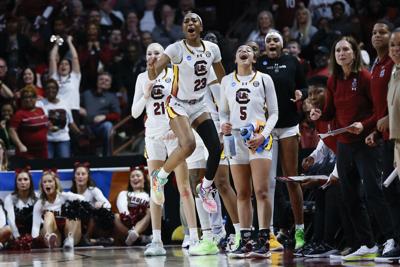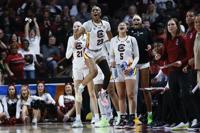ALBANY — Women’s college basketball “is in a really good place.”
That understatement comes from Dawn Staley, who would know.
For practical and immediate purposes on Thursday afternoon, that place was MVP Arena, which is one of two host sites for regional NCAA Tournament play this weekend, the other being the 19,000-seat home of the Portland Trail Blazers 3,000 miles away in Oregon.
Besides undefeated South Carolina, coached by dual Hall of Famer Staley, MVP Arena will be home to Iowa, defending national champion LSU, UCLA, Notre Dame, Indiana, Oregon State and Colorado for the next four days, and good luck (or bank account) getting a seat in the 15,500-seat gym.
As much as there can be these days, there was a Caitlin Clark vacuum in Albany on Thursday, since she and the Iowa Hawkeyes don’t play until Saturday and had no media responsibilities at the arena until Friday.
But as much as the record-setting superstar guard has helped push women’s college basketball into the collective consciousness of everyday sports fans, the reverse is true, too. What she has done didn’t happen in a vacuum. The sport itself has elevated her, too, and fans in Albany will get to see that first-hand for the next four days.
Context matters, and in the case of women’s college basketball, the sport has been blowing up in quality of play, popularity and exposure whether Caitlin Clark had ever shown up on the scene or not.
MVP Arena doesn’t need me or anyone else to sell women’s college basketball, since the sport has been doing a spectacular job of that on its own, despite marketing and broadcast forces that had conspired against its emergence in mainstream media for years.
If that sounds like tinfoil-hat conspiracy, ask UAlbany head coach Colleen Mullen, who prefaces any answer to this question by reminding people that she has an MBA and, well, knows how supply and demand work. Or read Kate Fagan’s terrific book, “Hoop Muses: An Insider’s Guide to Pop Culture and the (Women’s) Game.”
It’s worth noting that the coaches who were available at MVP Arena on Thursday fielded questions about whether the women’s tournament had grown past the practice of using home sites in the first and second rounds to ensure good attendance numbers.
That gives a tremendous advantage to high-seeded teams like South Carolina, Iowa, Notre Dame and UCLA, and the loud, boisterous, packed houses look great on TV, but women’s March Madness may have reached the point where that’s how neutral sites would look for those rounds, too.
“I know that there’s feelings either way, but for myself and our situation, we work really hard, and we fought to be able to be in that position to host,” Notre Dame head coach Niele Ivey said. “What you want to bring is soldout crowds. You want to bring the fan base. I think that that was accomplished.”
“Now with so much more publicity given to our sport, absolutely earned, but finally given, everybody is talking about our sport,” Oregon State head coach Scott Rueck said. “Everybody. People say, I love watching women's basketball more than men's. How many times I've heard that over my career? A lot. And it's usually from men who are shocked at how much they enjoy it. That has been a secret passion of mine that's not a secret any longer that I just love.”
Comments from MVP Arena general manager Bob Belber about the outpouring of response from the public to the March Madness games here and the economic benefit to the area brought nods of approval when relayed to the coaches.
The coaches would know.
“It’s a double-edged sword when it comes to this answer,” Staley said. “One is, I’ve said it before, that it’s been intentional to hold women’s basketball back. I do [believe that]. It’s no longer intentional, because they see we’re bursting at the seams, and for the general manager to say that, he’s going to ride this wave as long as it’s high. It’s high right now.
“We just want to be a sport. We just want to be treated as a sport. We just want an opportunity to be seen, and I do feel like it’s been very intentional to put us on TV, to put our sport on TV and everywhere.”
Staley listed a variety of components that have been on the rise, including star power.
She also marveled at how many games she watched from the comfort of her couch, how easy it was to find a robust variety of games and how it was sometimes a challenge to pick which one to watch.
“It’s pretty cool to see us forcing our way into this space,” she said. “And I don’t think we’re going to slow down anytime soon.”
Speaking of star power, fans at MVP Arena get to see, among others, Notre Dame freshman Hannah Hidalgo, South Carolina freshman MiLaysia Fulwiley and teammate Te-Hina Paopao, and LSU’s Angel Reese, Flau’jae Johnson and Aneesah Morrow.
If you’re interested in star power of a different stripe, LSU’s flamboyant dual Hall of Fame head coach Kim Mulkey, who won three national championships at Baylor before getting her fourth last year with the Tigers, tried to get out in front of an upcoming Washington Post story about her by issuing a statement last week.
In prepared remarks during the post-game press conference after LSU won its first-round game over Rice on March 22, she threatened to sue the Washington Post and writer Kent Babb for defamation of character.
So there’s that.
Hidalgo said she didn’t start watching women’s basketball until she was a junior in high school, and it took the play of the University of Arizona’s Aari McDonald, now a member of the WNBA Los Angeles Sparks, to get her to watch.
“I go into the hotel and see little girls, you know, kind of screaming my name at me like, 'Hey, Hannah, can I get a picture?'” Hidalgo said. “That's so big to me, because I love kids. For me, being able to make an impact in the younger generation is something that I never expected I would do, but to be in this situation, it's a blessing."
"A big reason I didn't really watch it was hearing the media saying, 'You know, women shouldn't be playing basketball, this is a man's sport, they should be back in the kitchen.' Seeing all that, it was like no encouragement.
“It was like, 'No, I don't really think I want to do this.' To see how much the women's game has grown from back then to now, it's big.”
“I have always enjoyed helping someone who has not respected our sport learn to,” Rueck said. “And it usually takes one game. Just give it a chance, one game.
“We don't have to be anything we're not. That's the other thing that I think people need to know. We don't need to be another sport or a version of another sport. We need to be us and tell our stories. … because there's 360 great stories. If they just were told. There's not four, I know that. We tend to latch on to four. But there's not four, it's a lot. It's just getting it out there.”
This half-joking rhetorical question comes from Rebecca Lobo, who would know.
“Have tickets sold out in Albany yet?”
She didn’t say it on Thursday, she said it back on Selection Sunday March 17 on ESPN, as soon as the full bracket was revealed.
It didn’t really have anything to do with the fact that Caitlin Clark might be coming here.
Well, maybe a little bit. But still …










